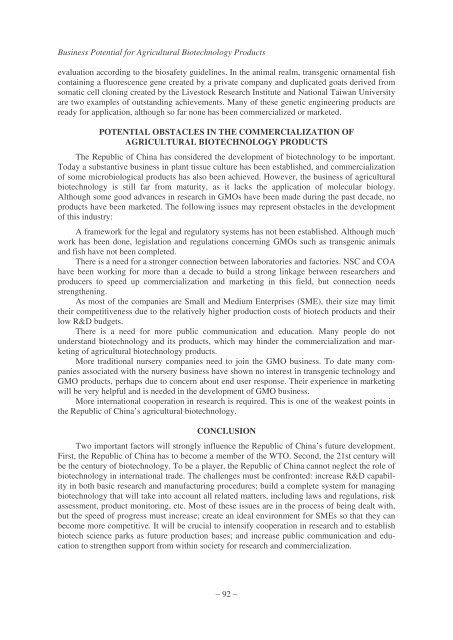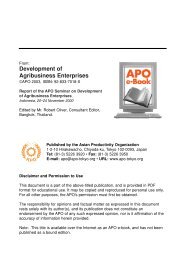Business Potential for Agricultural Biotechnology - Asian Productivity ...
Business Potential for Agricultural Biotechnology - Asian Productivity ...
Business Potential for Agricultural Biotechnology - Asian Productivity ...
You also want an ePaper? Increase the reach of your titles
YUMPU automatically turns print PDFs into web optimized ePapers that Google loves.
<strong>Business</strong> <strong>Potential</strong> <strong>for</strong> <strong>Agricultural</strong> <strong>Biotechnology</strong> Products<br />
evaluation according to the biosafety guidelines. In the animal realm, transgenic ornamental fish<br />
containing a fluorescence gene created by a private company and duplicated goats derived from<br />
somatic cell cloning created by the Livestock Research Institute and National Taiwan University<br />
are two examples of outstanding achievements. Many of these genetic engineering products are<br />
ready <strong>for</strong> application, although so far none has been commercialized or marketed.<br />
POTENTIAL OBSTACLES IN THE COMMERCIALIZATION OF<br />
AGRICULTURAL BIOTECHNOLOGY PRODUCTS<br />
The Republic of China has considered the development of biotechnology to be important.<br />
Today a substantive business in plant tissue culture has been established, and commercialization<br />
of some microbiological products has also been achieved. However, the business of agricultural<br />
biotechnology is still far from maturity, as it lacks the application of molecular biology.<br />
Although some good advances in research in GMOs have been made during the past decade, no<br />
products have been marketed. The following issues may represent obstacles in the development<br />
of this industry:<br />
A framework <strong>for</strong> the legal and regulatory systems has not been established. Although much<br />
work has been done, legislation and regulations concerning GMOs such as transgenic animals<br />
and fish have not been completed.<br />
There is a need <strong>for</strong> a stronger connection between laboratories and factories. NSC and COA<br />
have been working <strong>for</strong> more than a decade to build a strong linkage between researchers and<br />
producers to speed up commercialization and marketing in this field, but connection needs<br />
strengthening.<br />
As most of the companies are Small and Medium Enterprises (SME), their size may limit<br />
their competitiveness due to the relatively higher production costs of biotech products and their<br />
low R&D budgets.<br />
There is a need <strong>for</strong> more public communication and education. Many people do not<br />
understand biotechnology and its products, which may hinder the commercialization and marketing<br />
of agricultural biotechnology products.<br />
More traditional nursery companies need to join the GMO business. To date many companies<br />
associated with the nursery business have shown no interest in transgenic technology and<br />
GMO products, perhaps due to concern about end user response. Their experience in marketing<br />
will be very helpful and is needed in the development of GMO business.<br />
More international cooperation in research is required. This is one of the weakest points in<br />
the Republic of China’s agricultural biotechnology.<br />
CONCLUSION<br />
Two important factors will strongly influence the Republic of China’s future development.<br />
First, the Republic of China has to become a member of the WTO. Second, the 21st century will<br />
be the century of biotechnology. To be a player, the Republic of China cannot neglect the role of<br />
biotechnology in international trade. The challenges must be confronted: increase R&D capability<br />
in both basic research and manufacturing procedures; build a complete system <strong>for</strong> managing<br />
biotechnology that will take into account all related matters, including laws and regulations, risk<br />
assessment, product monitoring, etc. Most of these issues are in the process of being dealt with,<br />
but the speed of progress must increase; create an ideal environment <strong>for</strong> SMEs so that they can<br />
become more competitive. It will be crucial to intensify cooperation in research and to establish<br />
biotech science parks as future production bases; and increase public communication and education<br />
to strengthen support from within society <strong>for</strong> research and commercialization.<br />
– 92 –
















